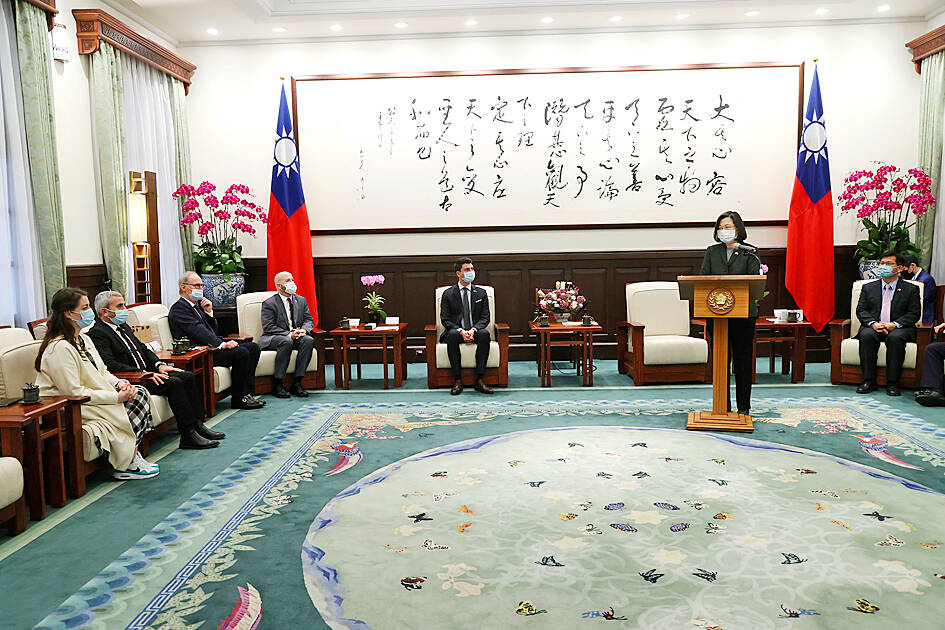A visiting Swiss cross-party delegation yesterday urged the Swiss government to sign an economic partnership agreement with Taiwan and support Taiwan’s participation in international organizations.
The delegation made the remarks during a meeting with President Tsai Ing-wen (蔡英文) at the Presidential Office in Taipei.
The delegation comprises Swiss national councilors Fabian Molina and Mustafa Atici of the Social Democratic Party, Nicolas Walder and Leonore Porchet of the Green Party, and Yves Nidegger of the Swiss People’s Party.

Photo: CNA
Russia’s war in Ukraine has shown “how fragile our rules-based multilateral world order is and how thin the thread is on which peace hangs,” Molina said.
“Authoritarianism and war must not prevail,” he added.
He thanked Taiwan for the invitation and hospitality, saying that the visit and the dialogue between the two sides are “more important today than ever.”
The Swiss National Council in 2021 instructed the government on how the nation could deepen its relations with Taiwan “in the interest of business, politics, science and culture,” with the delegation visiting to see whether this has borne fruit, he said.
Taiwan and China should resolve their differences and tensions “peacefully and through dialogue,” he said.
Walder, copresident of the Swiss-Taiwan parliamentary friendship group, said that the group, with more than 15 percent of all parliamentarians participating, is one of the most successful and shows “how important Taiwan is to us.”
The Swiss parliament will continue to urge the government to take concrete actions to deepen ties with Taiwan, such as establishing a bilateral economic partnership agreement, he said.
Switzerland can also use its influence in the international community to promote the inclusion of Taiwan in international organizations such as the WHO, he said.
He promised that the friendship group “will use all opportunities” to cement strong ties between Taiwan and Switzerland.
Tsai said the relations between Taiwan and Switzerland have become closer in recent years and the Swiss parliament has taken a greater interest in Taiwanese issues.
She thanked Molina, Walder and Atici for submitting pro-Taiwan motions to the Swiss parliament and other councilors for voicing their support for Taiwan during interpellations and by signing joint letters.
Taiwan and Switzerland are like-minded partners and share the values of democracy and freedom, she said.
As both nations are foreign trade-oriented economies and have complementary industrial strengths, Taiwan hopes to continue deepening economic and trade relations with Switzerland and work with it to safeguard the security of the democratic supply chain, she said.
Taiwan and Switzerland can also boost cooperation in other areas, such as tackling disinformation and improving cybersecurity, she added.
Standing on the front line in defending democracy, Taiwan will resolutely maintain regional peace and stability, she said.
In the face of expanding authoritarianism, Taiwan calls on democratic allies to stand together to “safeguard our way of life” and contribute to the resilience of global democracy, she added.
Later yesterday at a news conference in Taipei after the delegation visited Hsinchu Science Park, Molina said: “We arrived with the goal to show our solidarity with a democracy here in the region that is under pressure.”
Walder reiterated the importance of including Taiwan in international organizations, as it has been “living effectively independently for more than 70 years” and the world “cannot leave 25 million people outside of the international community.”

FORCED LABOR: A US court listed three Taiwanese and nine firms based in Taiwan in its indictment, with eight of the companies registered at the same address Nine companies registered in Taiwan, as well as three Taiwanese, on Tuesday were named by the US Department of the Treasury’s Office of Foreign Assets Control (OFAC) as Specially Designated Nationals (SDNs) as a result of a US federal court indictment. The indictment unsealed at the federal court in Brooklyn, New York, said that Chen Zhi (陳志), a dual Cambodian-British national, is being indicted for fraud conspiracy, money laundering and overseeing Prince Holding Group’s forced-labor scam camps in Cambodia. At its peak, the company allegedly made US$30 million per day, court documents showed. The US government has seized Chen’s noncustodial wallet, which contains

SUPPLY CHAIN: Taiwan’s advantages in the drone industry include rapid production capacity that is independent of Chinese-made parts, the economic ministry said The Executive Yuan yesterday approved plans to invest NT$44.2 billion (US$1.44 billion) into domestic production of uncrewed aerial vehicles over the next six years, bringing Taiwan’s output value to more than NT$40 billion by 2030 and making the nation Asia’s democratic hub for the drone supply chain. The proposed budget has NT$33.8 billion in new allocations and NT$10.43 billion in existing funds, the Ministry of Economic Affairs said. Under the new development program, the public sector would purchase nearly 100,000 drones, of which 50,898 would be for civil and government use, while 48,750 would be for national defense, it said. The Ministry of

SENATE RECOMMENDATION: The National Defense Authorization Act encourages the US secretary of defense to invite Taiwan’s navy to participate in the exercises in Hawaii The US Senate on Thursday last week passed the National Defense Authorization Act (NDAA) for Fiscal Year 2026, which strongly encourages the US secretary of defense to invite Taiwan’s naval forces to participate in the Rim of the Pacific (RIMPAC) exercise, as well as allocating military aid of US$1 billion for Taiwan. The bill, which authorizes appropriations for the military activities of the US Department of Defense, military construction and other purposes, passed with 77 votes in support and 20 against. While the NDAA authorizes about US$925 billion of defense spending, the Central News Agency yesterday reported that an aide of US

UNITED: The other candidates congratulated Cheng on her win, saying they hoped the new chair could bring the party to victory in the elections next year and in 2028 Former Chinese Nationalist Party (KMT) lawmaker Cheng Li-wun (鄭麗文) yesterday won the party’s chair election with 65,122 votes, or 50.15 percent of the votes. It was the first time Cheng, 55, ran for the top KMT post, and she is the second woman to hold the post of chair, following Hung Hsiu-chu (洪秀柱), who served from 2016 to 2017. Cheng is to succeed incumbent Eric Chu (朱立倫) on Nov. 1 for a four-year term. Cheng said she has spoken with the other five candidates and pledged to maintain party unity, adding that the party would aim to win the elections next year and